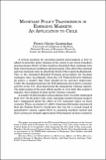| dc.contributor.author | Gourinchas, Pierre-Oliver | |
| dc.coverage.spatial | CHILE | es_ES |
| dc.date.accessioned | 2019-11-01T00:08:10Z | |
| dc.date.available | 2019-11-01T00:08:10Z | |
| dc.date.issued | 2018 | |
| dc.identifier.isbn | 978-956-7421-58-9 | |
| dc.identifier.uri | https://hdl.handle.net/20.500.12580/3863 | |
| dc.description | A critical question for emerging-market policymakers is how to adjust to monetary policy changes in the center. A core tenet of modern macroeconomic theory is that countries should let their exchange rate float when financial conditions abroad change. This allows the nominal and real exchange rates to absorb the brunt of the required adjustment. This is the standard Mundell-Fleming prescription for floating exchange rates. Accordingly when the U.S. Federal Reserve tightens its policy a country like Chile should let its currency depreciate. Under. the standard analysis the Fed tightening slows down economic activity in the U.S. thus depressing the demand for Chilean exports. The depreciation of the peso offsets partly or even fully this negative impulse thus helping to prop up the Chilean economy. | |
| dc.format | .pdf | |
| dc.format.extent | Sección o Parte de un Documento | |
| dc.format.medium | p. 279-324 | |
| dc.language.iso | eng | |
| dc.publisher | Banco Central de Chile | |
| dc.relation.ispartof | Series on Central Banking Analysis and Economic Policies no. 25 | |
| dc.rights | Attribution-NonCommercial-NoDerivs 3.0 Chile | * |
| dc.rights.uri | http://creativecommons.org/licenses/by-nc-nd/3.0/cl/ | * |
| dc.subject | POLÍTICA MONETARIA | es_ES |
| dc.title | Monetary policy transmission in emerging markets: an application to Chile | |
| dc.type.doc | Artículo | |
| dc.file.name | BCCh-sbc-v25-p279_324 | |


